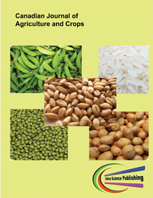Seed Dressing with Aqueous Allium sativum L. Extracts Enhanced the Tolerance of Maize Plant to Stalk and Ear Rot Disease Caused by Fusarium verticillioides (Sacc.) Nirenberg
DOI:
https://doi.org/10.20448/803.5.2.160.173Keywords:
Maize, Stalk and ear rot disease, Fusarium verticillioides Allium sativum, Seed dressing.Abstract
Stalk and ear rot is one of the most common fungal disease of maize. Significant crop failure and yield loss, arising from the disease, are reported annually. Maize grains infected with the pathogen pose serious threat to human and animal health, owing to mycotoxins contamination. The present study evaluated aqueous extracts from Allium sativum in the management of the disease. Four concentrations of the extracts were evaluated against the pathogen in vitro. The most promising concentrations, were applied as seed dressing agents in vivo at 5, 10 and 15-minutes duration for each concentration. Garlic extracts-dressed seeds were then transferred to F. verticilliodes infested medium and allowed to germinate and grow for 9 days. Seedlings were transplanted into sterile soils in plastic buckets thereafter. Data collected were subjected to analysis of variance and mean separation. The results obtained showed that peak inhibition of mycelial growth was achieved by 80% garlic extract concentration (76.29% at three days after inoculation). The in vivo study showed that the concentration of garlic extracts as well as the duration of treatment had significant effect on seed germination. Maize seeds dressed with 80% aqueous garlic extract had the least percentage germination, 43.33%, but recorded the least disease incidence and severity at 2 weeks after transplanting. It also had the best yield, fresh weight of cobs, 303.86 g, and the least percentage of kernel infection with F. verticillioides, 15.00%. Garlic extract has potential, as a bio-fungicide, in the management of stalk and ear rot disease of maize.


